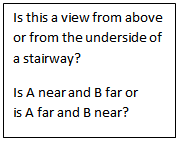If I wish to reform the world, I must begin with myself.
Beyond shame, beyond glory
A new (?) approach to religious adult education:
Confessing our shortcommings to one another
Getting out of the flipping box: it’s 100% one way or 100% the other.
[Shame: “There is danger, I don’t know what to do and nobody cares.”]
[Glorify: to make (something) seem much better or more important that it really is]



These drawings are either one war or the other, but never ½ way or between. This is a fundamental characteristic of shame; either fully one way to fuly the other.
(These days most politicians don’t discuss issues rationally, they try to shame their opponents and glorify themselves. Honesty about themselves and others is considered poor politics.)
If I said that the world has a long, long way to go, you would no doubt agree.
If I said that the UU church has a long, long way to go, many would think of me as a malcontent, many would feel hurt, because in order to glorify themselves they need to glorify the UU church.
The truth is there is very little about the UU church that I would change; I do suggest that we build a new, stronger foundation based on the Biblical injunction: Confess your sins to one another. (I define “sin” as an action contrary to a sound principle of successful living.
Emerson said; “Actions based on principles change people, places and events.”
To me there is no such thing as being “saved” as a permanent condition.
There is feeling save. From the very moment of birth on, our most deeply felt survival need is to feel that there are people who care about us. (We won’t survive otherwise.) When we feel that there people who care about us we feel safe.
Jesus said that if we confess our screw-up to one another we will feel safe.
We can feel safe because we know that people care about us because human beings are caring creatures by nature. Or we can try to feel safe because of who we think we are (in the eyes of other people.) To feel safe because of the image we project will never allow us to feel truly safe. We will always have that fear of the sudden revelation of unflattering truth. People, who, on an ongoing basis, confess their shortcomings to their friends and their tribe, do not fear sudden revelation, shame.
People, who feel a need to project a glorified self-image, tend to be very judgmental of others, who they feel are competitors. People who are image dependent feel that others who support their glorified self-image are worthy of caring about; but, people who don’t buy their glorified self-image are not worthy of any caring at all. It’s an all or nothing attitude.
In my drinking days I was afraid of people really getting to know me. I was afraid that if people knew the real me they would shun me.
When I went into AA, all I had to do was ask for help and I found a lot of people who genuinely cared about me, not because of who I was, but because they were caring people by nature.
I found people saying things in meetings that I thought people would never admit publicly, and they were not shunned or stoned, they were admired and valued for their truthfulness, courage and honesty. It seems that people who feel genuinely cared for and about can face and confront any truth. People who are image dependent can never really trust the truth, they will fear revelation of truth, and will never feel truly save.
Most UUs especially ministers are far too concerned about their images.
One of my most favorite thinkers, Buckminster Fuller hit a low point in his life in his middle 20s. He had been kicked out of Harvard as a ne’er-do-well and his six-year-old daughter had died. He decided that one of the reasons for pain in the world was that people use a lot of words that they don’t understand. He swore that he never again use a word that he could not define in terms of his own experience. He said very little for a couple of years, and then began writing and was world renowned for what he had to say.
I need to come up with come up with definitions of religious terminology defined in terms of my own experience. Grace is the result of actions based on principle.
I need to write about my experience with various principles; when I acted in harmony with them, what was the consequence; and when I acted contrary to them and what was that consequence.